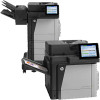HP Color LaserJet Enterprise MFP M680 LaserJet Analog Fax Accessory 500 - Fax - Page 59
Error codes, Fax error messages, Administration, Information, Troubleshooting
 |
View all HP Color LaserJet Enterprise MFP M680 manuals
Add to My Manuals
Save this manual to your list of manuals |
Page 59 highlights
Faxes are not printing on the product. Cause Incoming call may be a voice call. The incoming fax was interrupted. The Fax Printing Schedule feature is set to Always store faxes. Solution Incoming voice calls usually show up in the call report as a Communication Error (17) As these are voice calls and not a fax error, no action is needed to be taken. Ensure that those calling you have a voice number that is different from the fax number. Verify that the fax telephone line does not have an activated call-waiting feature. A call-waiting notice can interrupt a fax call in progress, which causes a communication error. Change the Fax Printing Schedule setting to Always print faxes. Error codes If a fax problem occurs which prevents or interrupts sending or receiving of a fax, an error code is generated that will help in determining the cause of the problem. Error codes show up in the fax activity log, the fax call report, and the T.30 Protocol Trace. Print one of these three reports to obtain the error code. A detailed description for some error codes and the appropriate action can be found at www.hp.com by searching for your product name. Fax error messages When an analog fax is sent or received on an HP LaserJet product, any errors that occur during the fax process will be displayed on the product control panel and entered into the fax reports. Fax errors can occur for many reasons and often they are due to interruptions or noise on the telephone connection. Any error that takes place during the fax process regardless of where it originates will be displayed by the product. If the fax process is interrupted or an error occurs during a fax transmission or reception, a two part status/error description is generated by the fax subsystem on the product. Normal or successful faxes also generate messages indicating success. The message information consists of a text description and a numeric code (a few messages don't include numeric codes). Only the text part of the message will be displayed on the product control panel; however, both the text message and numeric code will be listed in the Fax Activity Report, Fax Call Report, and the Fax T.30 Trace (these fax reports can be printed out individually from the product control panel - under the Administration > Information and Administration > Troubleshooting menus). The numeric code is shown in parentheses after the text part of the message in the reports. For example, if a communication error occurred, the control panel display would show Fax Failed: Communication Error. The same error would be shown in the Result field in the Fax Activity Report as Communication Error (17). For this example, the numeric code associated with this communication error is '17'. The numeric code is generated by the fax modem. Usually a numeric code of (0) indicates a normal modem response. Some messages will always display a numeric code of (0), whereas other messages can have a range of numeric codes depending on the circumstances, and a few messages will have no numeric code. Usually a numeric code of (0) indicates an error was not associated with the fax modem, but occurred in another part of the fax subsystem. Non-zero error codes give further detail into the particular action or process that the modem is executing, and they don't necessarily indicate that there is a problem with the modem. In the tables that follow, the fax messages with the most common number codes are given with recommended corrective action. Several messages that are normal or indicate a normal event are also included in tables. For example, if a fax was not able to be sent to a busy number, a Fail Busy ENWW Solve fax problems 47















